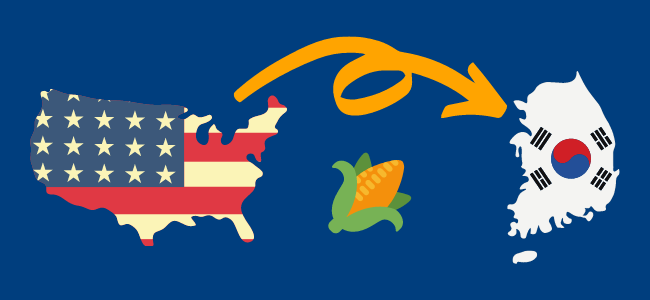Buyers and end-users in South Korea wanting to stay up to speed on the latest supply and demand influencers in the global grain market look to U.S. Grains Council (USGC) staff on the ground to answer their questions and provide new opportunities for trade expansion.
The 2020 USGC-Korean Feed Association (KFA) Joint Global Grain Market Issues and Outlook Conference, held on Nov. 18, was a clear example of this continual conversation between Korean customers and the representatives of U.S. farmers and agribusinesses. The conference is conducted each November to help grain and feed company executives plan their purchases for the upcoming year.
South Korea is a top importer of U.S. corn and distiller’s dried grains with solubles (DDGS). Buyers in the country imported 2.8 million metric tons (110.2 million bushels) of U.S. corn from January to October 2020, with the expectation that 3.2 million tons (nearly 126 million bushels) will be imported by the end of 2020. In that same timeframe, South Korean purchasers have imported 943,000 tons of U.S. DDGS, with expectations to exceed 1 million tons by the end of the year. For new crop corn, South Korea has purchased 2.5 million tons (98.4 million bushels) for 2021 deliveries since Oct. 16, currently ranking as the fifth-largest market (combining known sales and shipments to date).
The annual conference in South Korea is an important part of the market development work that makes these sales happen each year. This year’s conference was a hybrid event that combined on-site events with virtual programming, taking COVID-19 restrictions in South Korea and the United States into consideration. Sixty-two participants joined the in-person events, including the KFA chairman, the U.S. agricultural minister-counselor in South Korea and executives of the Korean feed and corn processing industries. An additional 98 buyers and end-users of U.S. corn and DDGS joined the virtual programming.
“No matter whether they attended on-site or virtually, participants were very satisfied with the opportunity to share expert insights through this highly effective hybrid program,” said Haksoo Kim, USGC director in South Korea. “The program provided an opportunity for Korean customers to gain expert insights into the latest grain market information, discuss current issues in the international grain market and expand U.S. corn and DDGS purchases.”
In his opening remarks, KFA Chairman Cho Chung-Hoon expressed his gratitude to the Council and the U.S. grain industry for their efforts to ensure U.S. grain exports were not disrupted by COVID-19. He also advocated for even stronger cooperation to continue meeting the shifting needs because of the pandemic and creating opportunities for win-win growth.
Panelists from both the United States and South Korea exchanged opinions on the major variables influencing the feed markets, including foreign currency, ocean freight and trade policy. The panel specifically addressed new crop corn quality, providing the latest information on the excellent quality of this year’s production. Question-and-answer sessions touched on Chinese bulk grain purchases, insights into the incoming Biden Administration’s potential trade policy stances and weather issues in South America.
This annual conference follows the Council’s Virtual Grain Exchange in October 2020, that provided an additional opportunity to share market information and keep Korean customers connected with U.S. suppliers. About 70 buyers and end-users from South Korea attended the virtual conference. Following the official program, 50 South Korean corn and DDGS buyers attended a virtual trade team to North Dakota and Illinois, which allowed participants the opportunity to take a deeper dive into the U.S. corn and DDGS supply chains.
“The Council’s programs – including the Virtual Grain Exchange and this conference – have contributed to significant bulk purchases by giving South Korean buyers confidence in the U.S. new crop corn quality and DDGS value,” Kim said. “Our customers in South Korea want to explore the U.S. supply chains and verify the quality for purchasing new U.S. corn. These events provide a solution that accomplishes that goal and strengthens partnerships between U.S. farmers and agribusinesses.”
About The U.S. Grains Council
The U.S. Grains Council develops export markets for U.S. barley, corn, sorghum and related products including distiller’s dried grains with solubles (DDGS) and ethanol. With full-time presence in 28 locations, the Council operates programs in more than 50 countries and the European Union. The Council believes exports are vital to global economic development and to U.S. agriculture’s profitability. Detailed information about the Council and its programs is online at www.grains.org.

